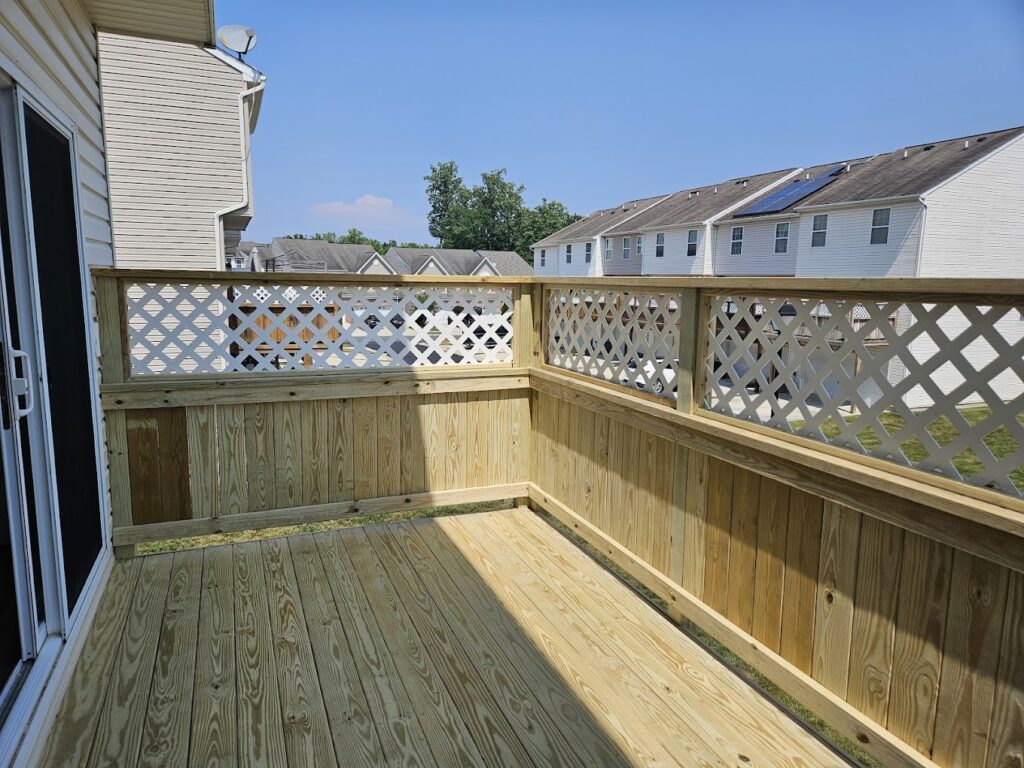Your deck is a cornerstone of outdoor living, offering a relaxing retreat and a valuable investment in your home. But like any structure exposed to the elements, decks wear down over time due to moisture, UV exposure, pests, and general wear and tear. Knowing when to replace your deck can save you from potential injury, property damage, or unexpected costs.
This guide will walk you through key warning signs, help you understand deck replacement costs, and highlight materials, tools, and techniques that can increase the longevity and safety of your deck.
How Long Does a Deck Last?
The life expectancy of a deck depends on the materials, maintenance, and environment:
- A standard wood deck (made of pine, pressure-treated lumber, or engineered wood) typically lasts 10–20 years.
- Composite material decks, including polymer and recycled plastic, can last 25–30 years with minimal upkeep.
- Teak and hardwood decking—often used in boat building and marine environments—offers premium durability.
Decks located near ocean air, high humidity, or snow may deteriorate faster if not properly sealed with paint, stain, or waterproofing sealant.
Top Warning Signs Your Deck Needs Replacement
If you’re unsure whether you need deck repair or a complete deck replacement, watch for the following red flags:
- Structural Rot or Fungus
- Extensive Cracking, Splintering, or Warping
- Loose Fasteners and Rusted Hardware
- Wobbly Railings or Sagging Decking
- Termite or Pest Infestation
- Failing Ledger Boards
- Mold, Mildew, and Moisture Damage
Rot spreads quickly through deck joists, beams, plywood, and stair treads. Look for spongy wood, discoloration, and softness around posts and footings—especially near the foundation or where the deck meets the home. Fungus and mold thrive in high-moisture, low-ventilation environments and pose both structural and health hazards.
While minor surface damage is normal, widespread cracking or splintering is a major concern—especially on stairs, decking boards, and handrails. Warped planks often signal underlying moisture issues or sun exposure over time.
Your deck’s integrity depends on screws, nails, bolts, joist hangers, and other fasteners. Rust, corrosion, or missing hardware indicates deeper structural problems. Use a screwdriver or hammer to test connections. If hardware is pulling away from the deck, it’s time to replace it.
Unstable handrails or staircases can result from weakened joists, beams, or footing connections. A deck that wobbles or sags under pressure is a serious safety hazard and should be addressed immediately by a professional deck replacement contractor.
Termites and pests can silently destroy structural components. Look for tunnels, sawdust piles, or soft wood in beams, stairs, and support posts. A professional pest control inspection is recommended if signs are present.
The ledger board is what connects the deck to your house. If it begins pulling away from the structure or shows signs of water damage, rot, or rusted fasteners, the entire deck could collapse—violating building codes and putting your safety at risk.
Excessive moisture creates the perfect environment for mold, mildew, and wood rot. If your deck has black spots, spongy areas, or smells musty, consider a replacement to avoid long-term damage.
What Influences Deck Replacement Cost?
The deck replacement cost can vary based on the following factors:
- Deck size, design, and layout (e.g., curved decks or multi-level patios)
- Materials used – such as composite, teak, engineered wood, or fiberglass
- Labor costs from your contractor or handyman
- Additional features like stairs, railing systems, furniture cutouts, glass panels, or built-in lighting
- Foundation work or concrete pier replacements
- Local regulations and permit fees
Don’t forget to budget for waste removal, recycling of old decking, and tools (e.g., circular saw, miter saw, drill bit, chisel, or caulk).
Genesis Contracting offers a detailed estimate for all decking projects, helping you evaluate price, materials, and scope with no obligation.
Materials Matter: Choose Smart for Longevity
When planning your wood deck replacement or new build, selecting durable materials is key to reducing maintenance and long-term costs.
- Composite decking: Highly durable, eco-friendly, and low-maintenance. Made from plastic, wood fiber, and recycled content, it’s ideal for busy homeowners or environmentally friendly designs.
- Pressure-treated pine: Budget-friendly and widely available but needs regular staining or sealing.
- Teak and hardwood: A luxury option known for natural oils and resistance to moisture, pests, and UV damage. Great for marine or sailboat-inspired designs.
- Aluminium and fiberglass: Fire-resistant, weather-resistant, and ideal for coastal or snow-heavy climates.
Using proper adhesives, epoxy sealants, and stainless-steel fasteners can further improve your deck’s resilience.
Extend Deck Life with Smart Maintenance
Even if you don’t need a replacement yet, regular deck maintenance goes a long way:
- Pressure washing once a year
- Reapplying paint, stain, or waterproofing every 2–3 years
- Checking for fastener corrosion or loose stair treads
- Trimming nearby trees or garden beds to reduce debris and rot risk
- Inspecting the deck after winter for snow damage or soil movement
If you’ve noticed recent damage but aren’t sure if it’s serious, ainn spection from a professional contractor can give you peace of mind.
When In Doubt, Call Genesis Contracting
If your deck is showing signs of age, damage, or structural instability, don’t wait until it becomes a hazard. At Genesis Contracting, we specialize in deck replacement, carpentry, outdoor design, and custom builds using a variety of high-performance materials to ensure safety, durability, and style.
Our expert team will guide you through every step of the process—from design consultation and material selection to professional installation—backed by a warranty and decades of construction experience.
Get your detailed estimate today and see why Genesis Contracting is the trusted name in home improvement and deck replacement across the region.

